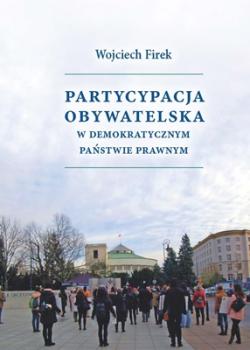Partycypacja obywatelska w demokratycznym państwie prawnym
Keywords:
civic participation, the Constitution of the Republic of Poland, civil society, democratic rule of law, civic budget, public consultations, public hearing, access to public informationSynopsis
CITIZEN PARTICIPATION IN A DEMOCRATIC STATE UNDER THE RULE OF LAW
The book analyses the functioning of civic participation in Poland as a constitutional and democratic state governed by the rule of law. Participation is presented from three research perspectives. First, as a theoretical model of citizen involvement in the sphere of action of public authorities. This model has been described objectively, subjectively, and functionally. The research is interdisciplinary and brings together a variety of social science disciplines. Second, civic participation is presented within the normative perspective as a constitutional value expressed indirectly in the Constitution of the Republic of Poland. The author made a holistic interpretation of the provisions of the Constitution, including the overarching constitutional principles: the principle of the common good (Article 1), the principle of a democratic state governed by the rule of law (Article 2), the principle of the sovereignty of the Nation (Article 4), and the principle of social dialogue (Article 20). The third perspective examines civic participation in practice. The author describes selected examples of civic participation institutions, taking into account its different levels: the level of information (e.g. accessto public information and access to the meetings of collegial bodies of public authorities coming from universal elections), the level of consultation (e.g., public consultations and public hearings), and the levelof co-determination and cooperation (e.g., civic budget and legal forms of commissioning the implementation of public tasks to non-governmental organisations). The analysis shows that Poland is systematically introducing and strengthening participatory institutions. However, the author also notes some risks in their practical application. The study confirms that civic participation based on civil, political, and social rights and institutions of social solidarity is an element of a democratic state governed by the rule of law and may be a solution to the problems of contemporary democracy.
Chapters
-
TABLE OF CONTENTS
-
Wykaz skrótów i skrótowców .......... 9
-
Wstęp .......... 11
-
Rozdział 1. Teoretyczny model partycypacji obywatelskiej .......... 19
-
1.1. Wprowadzenie .......... 19
-
1.2. Pojęcie partycypacji obywatelskiej .......... 20
-
1.3. Charakterystyka podmiotowa partycypacji obywatelskiej .......... 27
-
1.4. Charakterystyka przedmiotowa i funkcjonalna partycypacji obywatelskiej .......... 35
-
1.5. Podsumowanie .......... 45
-
ROZDZIAŁ 2. NORMATYWNE PODSTAWY PARTYCYPACJI OBYWATELSKIEJ W DEMOKRATYCZNYM PAŃSTWIE PRAWNYM .......... 47
-
2.1. Wprowadzenie .......... 47
-
2.2. Partycypacja obywatelska jako wartość konstytucyjna .......... 49
-
2.3. Konstytucyjne podstawy partycypacji obywatelskiej .......... 58
-
2.4. Realizacja konstytucyjnej wartości partycypacji obywatelskiej na poziomie ustawowym i podustawowym .......... 71
-
2.5. Podsumowanie .......... 80
-
ROZDZIAŁ 3. WYBRANE INSTYTUCJE PARTYCYPACJI OBYWATELSKIEJ W PERSPEKTYWIE PRAKTYCZNEJ .......... 83
-
3.1. Wprowadzenie .......... 83
-
3.2. Instytucje informowania .......... 84
-
3.3. Instytucje konsultowania .......... 95
-
3.4. Instytucje współdecydowania i współdziałania .......... 109
-
3.5. Podsumowanie .......... 122
Downloads
References





